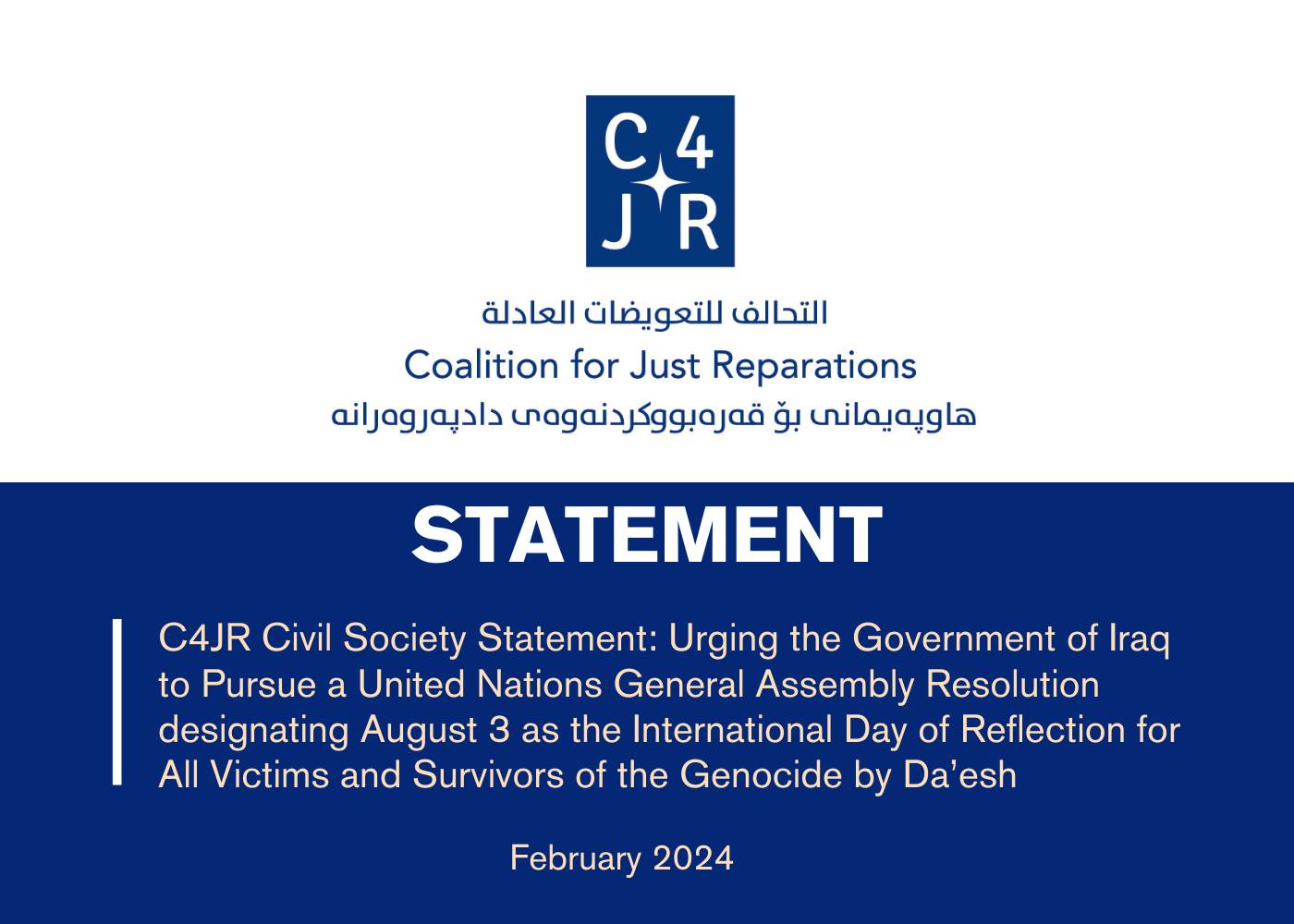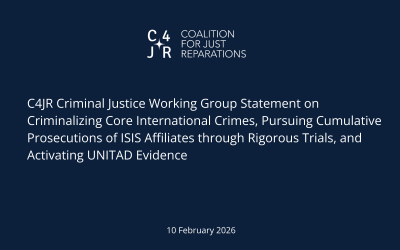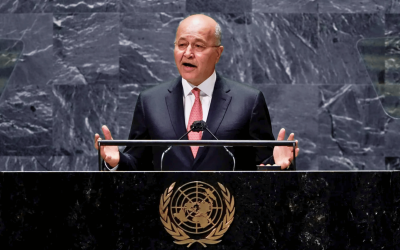Our statement urging the Government of Iraq to Pursue a United Nations General Assembly Resolution designating August 3 as the International Day of Reflection for All Victims and Survivors of the Genocide by Da’esh, published February 15, 2024.
ERBIL/LONDON — Members of the Coalition for Just Reparations (C4JR) urge the Government of Iraq to lead efforts at the United Nations General Assembly to adopt a resolution designating August 3 as the International Day of Reflection for All Victims and Survivors of the Genocide by Da’esh, in line with the Iraqi government’s existing recognition of the genocide against Yazidi, Christian, Shabak, and Turkmen communities in the 2021 Yazidi [Female] Survivors Law (YSL), Article 7.[1]
C4JR commends the bold efforts of the Government of Iraq in adopting the YSL, which aims to address different harms arising from the crimes of genocide and crimes against humanity inflicted upon members of ethno-religious minorities in Iraq by Da’esh and grant the necessary rights for Yazidi, Christian, Shabak, and Turkmen survivors, including compensation and rehabilitation. As members of civil society, we call on the Government of Iraq to demonstrate its leadership in ensuring the non-repetition of Da’esh crimes by mobilising the Member States of the United Nations to adopt a General Assembly resolution that will recognise the genocide internationally, as designated in the YSL, and establish a UN outreach programme to educate populations globally about Da’esh atrocities. We therefore encourage the following actions:
Call to Action for the United Nations General Assembly Resolution:
- 1) Designate August 3 as the International Day of Reflection for All Victims and Survivors of the Genocide by Da’esh.
This would follow the example of UN General Assembly Resolution (A/RES/58/234) on 23 December 2003, which declared 7 April 2004 the International Day of Reflection on the Genocide in Rwanda. It would encourage all Member States, United Nations agencies, and relevant international actors to observe the International Day, including special observances and activities in memory of the victims and survivors of the genocide by Da’esh. Each year, the UN Secretary-General would commemorate the genocide through an event at UN Headquarters. It would call on all Member States to ensure that there is no repetition of the genocide that occurred in northern Iraq in 2014 and prevent any harmful and stigmatizing rhetoric, hate speech, and other acts of violence against those groups.
- 2) Establish an Outreach Programme on the 2014 Genocide in Iraq.
An Outreach Programme is an information and educational outreach programme run by the UN Department of Global Communications. This would follow the example of the Outreach Programme on the 1994 genocide in Rwanda, which was established by the General Assembly on 23 December 2005 (A/RES/60/225) to “mobilize civil society for Rwanda genocide victim remembrance and education in order to help prevent future acts of genocide.”
By providing information materials which educate the global public about the 2014 genocide in Iraq, the outreach programme will focus on two main themes:
1). Preventing genocide: learning the lessons of the genocide to prevent similar acts in the future.
2). Supporting survivors: raising awareness of the lasting impact of the genocide on survivors, particularly widows, orphans and survivors of sexual violence, and the challenges they still face.
The UN will take the lead in implementing the programme in Iraq and around the world and would urge Member States to educate and raise awareness among civil society and future generations on the prevention of genocidal act or rhetoric, in particular targeting minority groups.
- 3) Facilitate assistance to survivors of the 2014 Genocide in Iraq, particularly orphans, widows, and survivors of sexual violence.
Following the example of UN General Assembly Resolution 225 (A/RES/60/225), this resolution would request the Secretary-General to take all necessary and practicable measures for the implementation of the present resolution and to report thereon to the General Assembly.
The UN General Assembly would invite agencies, funds, and programmes of the United Nations to ensure that assistance is provided in the areas identified as priorities by the Government of Iraq, notably education, medical care, trauma and psychological counselling for genocide survivors, and skills training aimed at promoting self-sufficiency. We call for this to be prioritized in the agenda of the upcoming General Assembly.
Conclusion and Impact:
The support of the Government of Iraq in introducing this resolution at the UN General Assembly is a critical step towards enshrining the August 3 anniversary in the public domain.
In 2016, the US House of Representatives voted unanimously that the crimes committed against Yazidis, Christians, and other groups by Da’esh were acts of genocide; later that year, the French Senate unanimously approved a similar resolution. More recently in 2023, both the German Bundestag and the UK Government acknowledged that the atrocities committed against the Yazidi people by Da’esh amount to genocide. Yet despite these recognitions, UNITAD’s legal determination in 2021 that the crimes against the Yazidis amount to genocide, and the convictions in German courts of Da’esh members for the crime of genocide, the United Nations and many of its member states have yet to formally recognise the genocide. Stronger recognition is needed.
By pursuing a UN General Assembly Resolution designating August 3 as the International Day of Reflection for All Victims and Survivors of the Genocide by Da’esh, the Government of Iraq would advocate for global recognition and commemoration of the genocide, as well as mechanisms for education, outreach, and UN attention and assistance.
Article 7 of the YSL calls on Iraq’s Ministry of Foreign Affairs, in coordination with the official concerned institutions, to “reveal these crimes in international forums.” As the tenth anniversary of August 3, 2014, approaches, the time to act is now.
C4JR member organisations:
1. ASUDA
2. Better World Organization for Community Development (BWOCD)
3. CAPNI for Humanitarian Aid in Iraq
4. Civil Development Organization (CDO)
5. Dak Organization
6. Emma
7. Eyzidi Organization for Documentation
8. Farida Global Organization
9. Ghasin Alzaiton
10. Hammurabi Human Rights Organization (HHRO)
11. Harikar
12. HÁWAR.Help
13. Iraqi Educational Association AL Basra
14. The Iraqi Educators League
15. Iraqi Institution for Development (IID)
16. Jinda Organization
17. Justice Organization for Minority Rights (JOMR)
18. Methra Organization
19. Nadia’s Initiative (NI)
20. National Centre for Human Rights (NHCR)
21. Nisha Organization
22. Peace and Freedom Organization
23. SEED Foundation
24. Sustainable Peace Foundation (SPF)
25. TAJDID Iraq
26. The Free Yezidi Foundation (FYF)
27. The Jiyan Foundation for Human Rights
25. The Lotus Flower
28. The Observer Human Rights Center (OHRC)
29. To Reconcile Organization (TRO)
30. Turkmen Rescue Foundation
31. Women Leadership Institute (WLI)
32. Women Legal Assistance Organization (WOLA)
33. Yazda
For more information, contact: Alannah Travers: [email protected], or Saber Saeed: [email protected]
[1] “Crimes committed by Daesh against the Yazidis and other components, (Turkmen, Christians and Shabaks) shall be considered crimes of genocide and crimes against humanity.” — Article 7 of the Yazidi Survivors’ Law, 2021. https://c4jr.org/ysl



